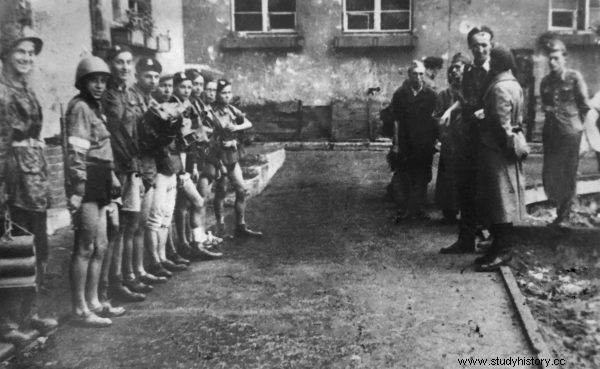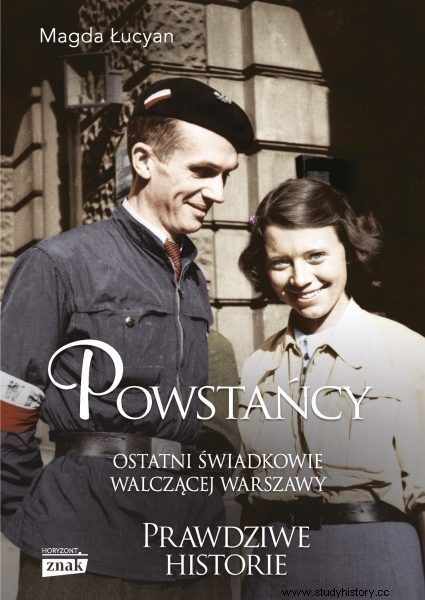For 63 days they heroically fought with the hope that they would liberate the capital. During this time they saw and experienced terrible things - those who had the chance to survive. Death of friends, methodical destruction of the city and the fall of dreams of freedom. Among so many traumatic memories, can they point to the worst?
The journalist Magda Łucyan asked about the most painful eyewitness memories of the events from 75 years ago in the book Insurgents. The last witnesses of fighting Warsaw ” . The answers she received create a shocking picture of the uprisings and falls from which these young people then had to rise again and again - to continue facing the Nazis. What was the most difficult for them in those tragic months of 1944?
The ranks of the dead
When life is at stake, a person begins to get used to death. Which does not mean that seeing friends, parents and siblings dying can ever become commonplace. In the accounts of the insurgents who survived, the memories of their beloved deceased return, with whom they have often not been able to say goodbye. This was the case, for example, in the case of Andrzej Wiczyński "Antek". As he said:
The first commander of platoon 227 was my friend - Andrzej Hebrowski pseud. "Adam" (…). He ran for the charge without a helmet and got hit. Bullet shards pierced his head and stayed in his brain. He died on the spot. (...) I experienced the death of each of my platoon (five of my boys except Adam), but this one is the most. At the same time, I knew that I had to come to terms with my fate. What was I supposed to do?
Despite the unimaginable loss, the nurse Anna Jakubowska, pseudonym "Paulinka", also had to come to terms with her fate. Wounded on the ninth day of fighting, she was eliminated from the operations at the front. So she started working in a hospital, where she treated the wounded, assisted doctors, organized meals for patients.
Soon after, her sister was brought to the facility - also a nurse in the "Zośka" battalion. Her legs were crushed. When the decision to evacuate was made, it turned out that she could not be transported. Anna did not want to leave her, but was ordered to escort the less wounded through the sewers. She went. Meanwhile, the Germans seized the Old Town and bombed the hospital (despite the Red Cross flag on the roof). Paulinka's sister died.

Communication between the districts of fighting Warsaw could only take place through canals. In the photo, the so-called sewer rats, "Antek" first from the right. Photo from the book "Insurgents".
75 years later, a woman said with pain:“to this day I ask myself if I did the right thing to go. Today, years later, it seems to me that I shouldn't have carried out this command ". To the statement that if she had stayed with her sister, she would most likely have died alone, she replied:"Maybe I would have preferred it".
City on fire
The insurgents were traumatized not only by the death of their loved ones, but also by the slow agony of the beloved Warsaw, accompanied by bombings and screams of the dying and wounded on both sides of the barricade. Before their eyes, the city where they were born and raised was falling into ruins.
Even after 75 years, this painting persecuted, among others, Edmund Baranowski "Jura". Magda Łucyan in the book "Insurgents" he writes:“When I ask about this worst memory," Jur "has no doubts. It is a massacre in Wola district ”. How did Baranowski describe the slaughter of the district that the Germans committed on the fourth day of the Uprising?
The outskirts were on fire first, and the whole neighborhood a day later. It was as light at night as during the day. Figures half-maddened occasionally emerged from the burning streets. They told about what happens where they come back. About mass executions, regardless of age and sex, about the mass arson of houses ...
I remember being so helpless, knowing we couldn't help. (…) The sight of the burning Will is still in my eyes today. Nobody knows how many people died then. Thirty, forty or fifty thousand? The fact was that the entire district ceased to exist. My district…

The curiosity is based on the book by Magda Łucyan "Powstańcy. The last witnesses of fighting Warsaw " (Horizon 2019 sign).
After such an experience, it is impossible to shake off - and yet that was only the beginning of the fights! We had to wait two months for their completion, although the insurgents did not suspect it at the time, convinced that the uprising would last a maximum of several days. And it was by no means a happy ending.Hope dies in the end
For many participants of the uprising, the worst memory was when - to themselves and to the rest of the world - they had to admit that they had failed. Hanna Stadnik, pseudonym "Hanka" said:" Surrender was the most horrible day in my life for me. (...) We had the feeling that after two months of hard struggle and inhuman effort, everything was wasted ".
Wanda Traczyk-Stawska, nicknamed "Pączek", who was only seventeen at the time, had a similar experience of giving up her arms. She fought in Śródmieście and Powiśle, and after the fall of the uprising, she was a prisoner of war in four camps. As she described:
The worst moment in any soldier's life is surrender. A soldier feels guilty about surviving, giving up when his comrades in arms are dead. I felt like I was betraying those who died I felt that I should not be living myself. It was the scariest moment and my worst memory.
The fall of the uprising also became the main argument of those who criticized the underground leadership's decision to organize the uprising. After all, not only did the Poles fail, but also the city was completely destroyed. The death toll reached almost 200,000 people. However, the insurgents themselves assessed it differently.
Although the capitulation became a huge trauma for them, most were convinced that regardless of their orders, the uprising would break out anyway. Not everything was in vain either. General Zbigniew Scibor-Rylski "Motyl" stated during an interview with Magda Łucyan, which turned out to be his last public appearance:
The hardest part was looking at these little babies and poor mothers who had nothing to feed their babies. When I was walking through the cellars from one building to another, I saw those terribly poor mothers who, despite such a huge tragedy, did not complain.
They understood that Poland would be strong when the young and the next generations would be strong, when they would give their best. Maybe it is pathetic, maybe the young people will say:"Let him talk!", But let us remember that without the Uprising, without winning achievements, today we would not have such a wonderful Warsaw .
Material prepared by the former CiekawostekHistorycznych.pl team, which parted ways with the portal at the end of July 2019.
Source:
Trivia is the essence of our website. Short materials devoted to interesting anecdotes, surprising details from the past, strange news from the old press. Reading that will take you no more than 3 minutes, based on single sources. This particular material is based on the book:
- Magda Łucyan, Insurgents. The last witnesses of fighting Warsaw , Horizon 2019 sign.
Accounts of the last witnesses of fighting Warsaw in the book “Powstańcy. The last witnesses of fighting Warsaw ":
